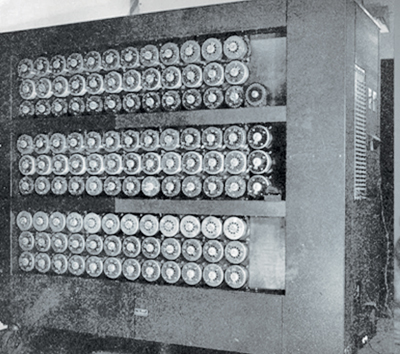Robots to do jobs in the future?
Artificial Intelligence (AI) is one of the most significant inventions of the 21st Century. AI is a form of technology that simulates human intelligence. While AI can perform tasks that typically require human intelligence, it still relies on human input for learning.

Alan Turing
However, with advancements in technology, it is possible that AI will eventually be able to learn independently.
Throughout, human history, countless inventions have made our daily lives more comfortable. Among these, AI stands out as a particularly important innovation. It is, without a doubt, one of the greatest achievements of humankind.
The Turing machine: The first step towards AI
During World War II, the English military needed to know secret messages sent by the Nazis. Messages by Nazis were encrypted using a mathematical code that changed every 24 hours. Alan Turing, a volunteer, proposed creating a machine to break the code. Fortunately for the English military, Turing’s machine, later known as the Turing Machine, successfully deciphered the Nazi messages. This machine is considered the first to use AI technology.
Generative AI and the modern world
Today, almost every leading company, including Apple, Microsoft, Google, and OpenAI, is developing AI products or services. AI voice assistants, such as Google Assistant, Apple Siri and Amazon Alexa, have become integral parts of daily life, helping with tasks like checking the weather, setting reminders, and making recommendations. In addition to these, Generative AI technology can create highly realistic images from text descriptions. Some platforms now offer AI chatbots capable of generating entire videos based on the text provided.
The future with AI: Robots in the workforce

Alan Turing invents the first AI computer during World War II
It is clear that AI will play a significant role in the future. Some people would argue that with the improvement of AI, the opportunities in the job market will be low. Well, it can be true because many jobs will be replaced with robots that have artificial intelligence. That will be a huge disadvantage of AI technology. With the upcoming Generative AI technologies, children can easily copy their homework using AI. This can affect their thinking capacity.
However, AI also offers several advantages. Its accuracy and efficiency can help us complete tasks faster, giving us more free time.
Decision-making processes could also become easier with the assistance of AI. While there are both pros and cons to AI, it is essential to remember that the human brain should always take precedence. Relying too heavily on machines may not always be the best approach.
By
K.D Shenon Rashmintha
Grade 9
Loyola College
Negombo






